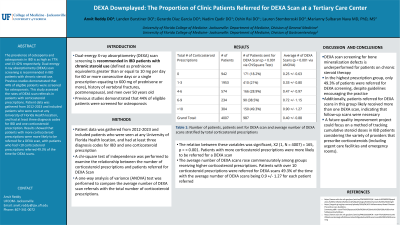Sunday Poster Session
Category: IBD
P0893 - DEXA Downplayed: The Proportion of Clinic Patients Referred for DEXA Scan at a Tertiary Care Center
Sunday, October 27, 2024
3:30 PM - 7:00 PM ET
Location: Exhibit Hall E

Has Audio

Anvit D. Reddy, DO
University of Florida College of Medicine
Jacksonville, FL
Presenting Author(s)
Anvit D. Reddy, DO1, Landen Shane Burstiner, DO, MSc1, Gerardo Diaz Garcia, DO1, Nadim A. Qadir, DO2, Oshin Rai, DO1, Lauren N.. Stemboroski, DO1, Marianny Sulbaran Nava, MD, PhD, MS1
1University of Florida College of Medicine, Jacksonville, FL; 2University of Florida College of Medicine, Windermere, FL
Introduction: Corticosteroid use, a cornerstone of inflammatory bowel disease (IBD) management, is strongly associated with bone mineralization defects. The prevalence of osteopenia and osteoporosis in IBD is as high as 77% and 13-42% respectively. Dual-energy X-ray absorptiometry (DEXA) scan screening is recommended in IBD patients with chronic steroid use (defined as prednisone equivalents greater than or equal to 10 mg per day for 60 or more consecutive days or a single prescription equating to 600 mg of prednisone or more), history of vertebral fractures, postmenopausal, and men over 50 years old. Previous studies demonstrated that 44% of eligible patients were screened for osteoporosis. This study assessed the rates of DEXA scan referrals in patients with corticosteroid prescriptions.
Methods: Patient data was gathered from 2012-2023 and included patients who were seen at any University of Florida Health location, and had at least three diagnosis codes for IBD and one corticosteroid prescription. A chi-square test of independence was performed to examine the relationship between the number of corticosteroid prescriptions and patients referred for DEXA Scan. A one-way analysis of variance (ANOVA) test was performed to compare the average number of DEXA scan referrals with the total number of corticosteroid prescriptions.
Results: The relation between these variables was significant, X2 (1, N = 4007) = 165, p = < 0.001. Patients with more corticosteroid prescriptions were more likely to be referred for a DEXA scan. The average number of DEXA scans rose commensurately among groups receiving higher corticosteroid prescriptions. Patients with over 10 corticosteroid prescriptions were referred for DEXA scans 49.3% of the time with the average number of DEXA scans being 0.9 +/- 1.27 for each patient referred.
Discussion: DEXA scan screening for bone mineralization defects is underperformed for patients on chronic steroid therapy. In the highest prescription group, only 49.3% of patients were referred for DEXA screening, despite guidelines encouraging the practice. Additionally, patients referred for DEXA scans in this group likely received more than one DEXA scan, indicating that follow-up scans were necessary. A future quality improvement project could focus on a method of tracking cumulative steroid doses in IBD patients considering the variety of providers that prescribe corticosteroids (including urgent care facilities and emergency rooms).
Note: The table for this abstract can be viewed in the ePoster Gallery section of the ACG 2024 ePoster Site or in The American Journal of Gastroenterology's abstract supplement issue, both of which will be available starting October 27, 2024.
Disclosures:
Anvit D. Reddy, DO1, Landen Shane Burstiner, DO, MSc1, Gerardo Diaz Garcia, DO1, Nadim A. Qadir, DO2, Oshin Rai, DO1, Lauren N.. Stemboroski, DO1, Marianny Sulbaran Nava, MD, PhD, MS1. P0893 - DEXA Downplayed: The Proportion of Clinic Patients Referred for DEXA Scan at a Tertiary Care Center, ACG 2024 Annual Scientific Meeting Abstracts. Philadelphia, PA: American College of Gastroenterology.
1University of Florida College of Medicine, Jacksonville, FL; 2University of Florida College of Medicine, Windermere, FL
Introduction: Corticosteroid use, a cornerstone of inflammatory bowel disease (IBD) management, is strongly associated with bone mineralization defects. The prevalence of osteopenia and osteoporosis in IBD is as high as 77% and 13-42% respectively. Dual-energy X-ray absorptiometry (DEXA) scan screening is recommended in IBD patients with chronic steroid use (defined as prednisone equivalents greater than or equal to 10 mg per day for 60 or more consecutive days or a single prescription equating to 600 mg of prednisone or more), history of vertebral fractures, postmenopausal, and men over 50 years old. Previous studies demonstrated that 44% of eligible patients were screened for osteoporosis. This study assessed the rates of DEXA scan referrals in patients with corticosteroid prescriptions.
Methods: Patient data was gathered from 2012-2023 and included patients who were seen at any University of Florida Health location, and had at least three diagnosis codes for IBD and one corticosteroid prescription. A chi-square test of independence was performed to examine the relationship between the number of corticosteroid prescriptions and patients referred for DEXA Scan. A one-way analysis of variance (ANOVA) test was performed to compare the average number of DEXA scan referrals with the total number of corticosteroid prescriptions.
Results: The relation between these variables was significant, X2 (1, N = 4007) = 165, p = < 0.001. Patients with more corticosteroid prescriptions were more likely to be referred for a DEXA scan. The average number of DEXA scans rose commensurately among groups receiving higher corticosteroid prescriptions. Patients with over 10 corticosteroid prescriptions were referred for DEXA scans 49.3% of the time with the average number of DEXA scans being 0.9 +/- 1.27 for each patient referred.
Discussion: DEXA scan screening for bone mineralization defects is underperformed for patients on chronic steroid therapy. In the highest prescription group, only 49.3% of patients were referred for DEXA screening, despite guidelines encouraging the practice. Additionally, patients referred for DEXA scans in this group likely received more than one DEXA scan, indicating that follow-up scans were necessary. A future quality improvement project could focus on a method of tracking cumulative steroid doses in IBD patients considering the variety of providers that prescribe corticosteroids (including urgent care facilities and emergency rooms).
Note: The table for this abstract can be viewed in the ePoster Gallery section of the ACG 2024 ePoster Site or in The American Journal of Gastroenterology's abstract supplement issue, both of which will be available starting October 27, 2024.
Disclosures:
Anvit Reddy indicated no relevant financial relationships.
Landen Shane Burstiner indicated no relevant financial relationships.
Gerardo Diaz Garcia indicated no relevant financial relationships.
Nadim Qadir indicated no relevant financial relationships.
Oshin Rai indicated no relevant financial relationships.
Lauren Stemboroski indicated no relevant financial relationships.
Marianny Sulbaran Nava indicated no relevant financial relationships.
Anvit D. Reddy, DO1, Landen Shane Burstiner, DO, MSc1, Gerardo Diaz Garcia, DO1, Nadim A. Qadir, DO2, Oshin Rai, DO1, Lauren N.. Stemboroski, DO1, Marianny Sulbaran Nava, MD, PhD, MS1. P0893 - DEXA Downplayed: The Proportion of Clinic Patients Referred for DEXA Scan at a Tertiary Care Center, ACG 2024 Annual Scientific Meeting Abstracts. Philadelphia, PA: American College of Gastroenterology.
